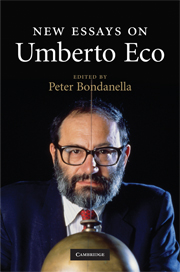Book contents
- Frontmatter
- Contents
- Notes on contributors
- Preface
- Acknowledgments
- 1 Eco and popular culture
- 2 Eco's semiotic theory
- 3 Eco's scientific imagination
- 4 From the Rose to the Flame: Ecos theory and fiction between the middle Ages and postmodernity
- 5 Eco's middle Ages and the historical novel
- 6 Eco and the tradition of the detective story
- 7 “The subject is in the adverbs.” The role of the subject in Eco's semiotics
- 8 Double coding memorabilia in The Mysterious Flame of Queen Loana
- 9 Eco and Joyce
- 10 Eco on film
- Selected bibliography on Eco
- Index
5 - Eco's middle Ages and the historical novel
Published online by Cambridge University Press: 26 January 2010
- Frontmatter
- Contents
- Notes on contributors
- Preface
- Acknowledgments
- 1 Eco and popular culture
- 2 Eco's semiotic theory
- 3 Eco's scientific imagination
- 4 From the Rose to the Flame: Ecos theory and fiction between the middle Ages and postmodernity
- 5 Eco's middle Ages and the historical novel
- 6 Eco and the tradition of the detective story
- 7 “The subject is in the adverbs.” The role of the subject in Eco's semiotics
- 8 Double coding memorabilia in The Mysterious Flame of Queen Loana
- 9 Eco and Joyce
- 10 Eco on film
- Selected bibliography on Eco
- Index
Summary
In the past twenty-five years, the ascendancy of Umberto Eco's reputation as a historical novelist has coincided with increased critical attention to the historical novel's theoretical possibilities and cultural significance. The enormous international success of The Name of the Rose is itself responsible for some of this new critical interest in the genre. The late twentieth- century mass-market appeal of a deeply erudite story set in a fourteenth-century Benedictine monastery has encouraged analysis of Eco's decision to render his central concerns as a theorist, journalist, and cultural critic in that narrative form. Eco's subsequent endeavors as a fiction writer have demonstrated an abiding affinity between those concerns and opportunities for representation that the historical novel affords. In different senses of the word, all of Eco's novels engage fundamentally with the challenges and problems of writing history and thinking historically, whether these are articulated through carefully constructed, temporally distant worlds, as in the case of The Name of the Rose, The Island of the Day Before, and Baudolino, or through more contemporary settings and characters preoccupied with the past and memory, as in Foucault's Pendulum and The Mysterious Flame of Queen Loana. Through their extended meditation on the means by and materials through which we encounter the past, these novels illustrate central attributes of postmodern historical fiction identified in recent theoretical analyses of that genre. Eco's novels bear witness to this fiction's reflexive scrutiny of the human capacity for historical knowledge and critique the prospects for historical and fictive discourses to give access to such knowledge.
- Type
- Chapter
- Information
- New Essays on Umberto Eco , pp. 71 - 89Publisher: Cambridge University PressPrint publication year: 2009
- 2
- Cited by



